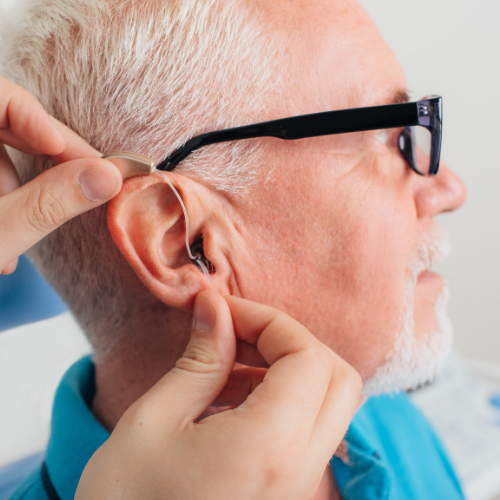Author: Kelechi Edeh
For the very first time, Americans can now buy hearing aids over-the-counter (OTC) at local pharmacies, drug shops, and major online stores at a potentially reduced price. This announcement comes months following the Food and Drug Administration’s (FDA) ruling, which permitted drug stores to sell hearing aids without a prescription.
Additionally, experts are optimistic that opening the market will drive the development of new devices, reduce costs, and promote the usage of hearing aids.
According to specialists, if you’re considering buying a hearing aid, many things are still unclear, such as which devices will be released in the upcoming weeks and how much they may cost. However, over-the-counter hearing aids can be just what you need if you have mild to moderate hearing loss.
Here’s what you need to know before you buy one!
What to know about the OTC hearing aids
Here are a few things you need to know about over-the-counter hearing aids:
When will over-the-counter hearing aids be available at stores?
The first over-the-counter hearing aids will go on sale this week at some retailers, including Walgreens pharmacies, both online and offline.
On October 17, Walmart also disclosed that hearing aids would be available online, at Walmart Vision Centers in a few areas (although the company expects to make these services available everywhere eventually), and at over 400 Sam’s Club Hearing Aid Centers.
In the upcoming weeks, additional retailers will carry the over-the-counter hearing aids. For instance, Best Buy revealed on October 17 that at the end of the month, it would open hearing centers in 300 of its locations.
Should I buy an OTC hearing aid?
Before making a purchase, you must determine your eligibility for an OTC hearing aid. OTC hearing aids are ideal for adults with mild-to-moderate hearing loss, according to Rebecca Lewis, an audiologist and the Audiology Director at Providence Saint John’s Health Center in Santa Monica, California.
“A person may be a fine fit for an over-the-counter hearing aid if they can hear relatively well in quiet places but have trouble hearing background noises,” Lewis continued.
Turning up the volume on your phone or television indicates that you might qualify for an over-the-counter hearing aid. However, those with severe hearing loss could find it challenging to hear during one-on-one conversations, particularly in a quiet setting.
You can use this helpful checklist from the Hearing Loss Association of America or have an audiologist assess your hearing loss to find out how severe it is.
Additionally, if you’re tech-savvy, you should consider purchasing the OTC hearing aid because it needs some adjusting to get the fit and settings right. On the other hand, consider seeing an audiologist to help set up your OTC device if you’re not the most technologically adept person you know.
How much do OTC hearing aids cost?
The cost of hearing aids varies. Over-the-counter (OTC) models cost anywhere from a few hundred to several thousand dollars. On the other hand, the FDA claims that hearing aids that need a prescription usually cost a few thousand dollars. But other services are frequently included in that fee.
Does insurance cover OTC hearing aids?
While hearing aids and hearing aid fittings are not covered by Medicare, some Medicare Advantage plans do. On the other hand, some private insurers include hearing aids as a part of their insurance packages. So, consult your insurance provider to see if hearing aids are part of your policy.
How to choose an OTC hearing aid
Hearing aids will not work the same way for everybody because everyone’s hearing loss is different. Over-the-counter hearing aids fall into two categories:
- A self-adjusting device that works by connecting it to an app on your mobile phone and adjusting it by listening to sounds.
- A simple modifier allows you to manually control the volume, bass, and treble of sounds.
Overall, you may be unable to determine which device is best for your needs until you use it. As a result, getting one with a warranty is critical so you can return it if the device doesn’t suit your needs. The FDA requires the device’s packaging to state whether a customer can return it – look out for hearing aids that follow this FDA rule.
The bottom line
Thanks to a recent Food and Drug Administration rule, over-the-counter hearing aids are now accessible at local drugstores (FDA) near you. Adults with mild to moderate hearing loss can purchase OTC hearing aids. However, individuals with more severe hearing loss would require the assistance of an audiologist to get the care they need.

